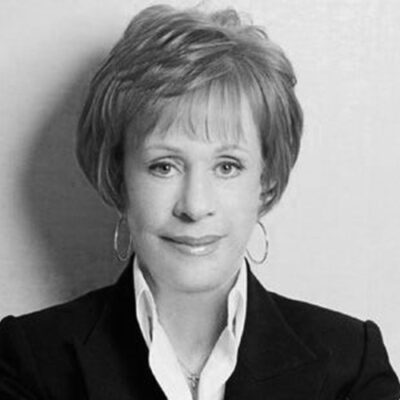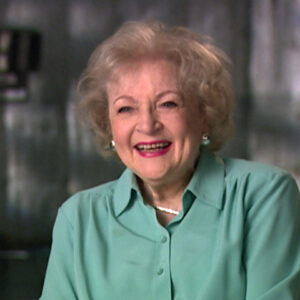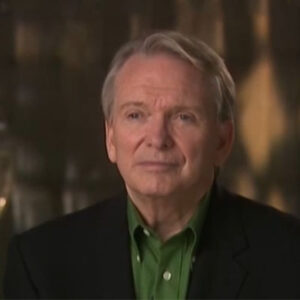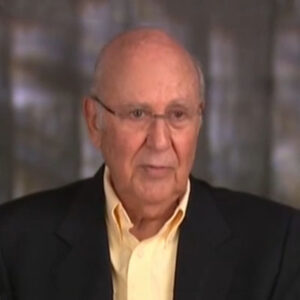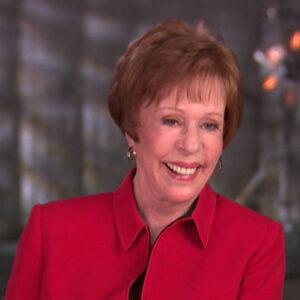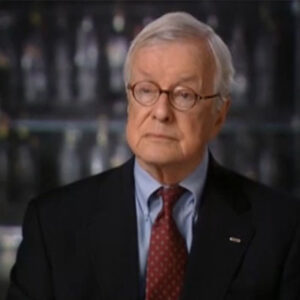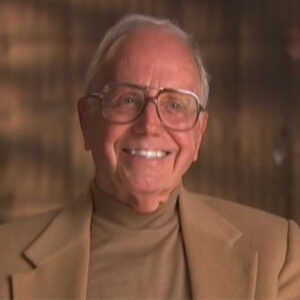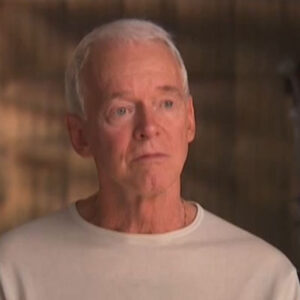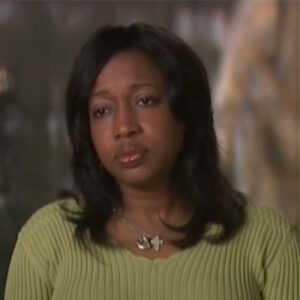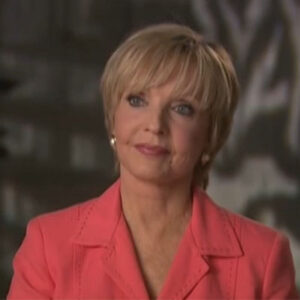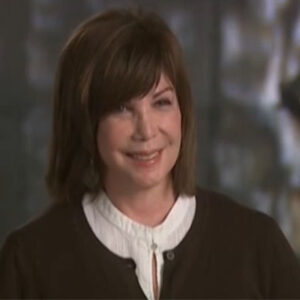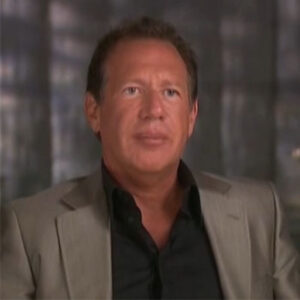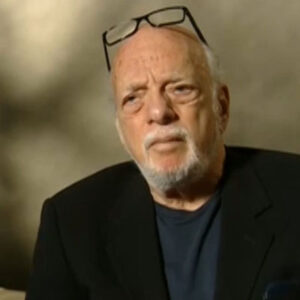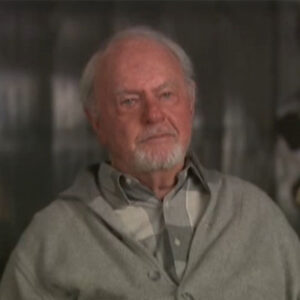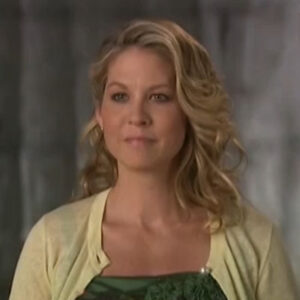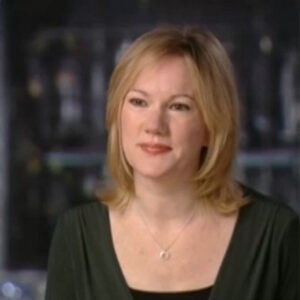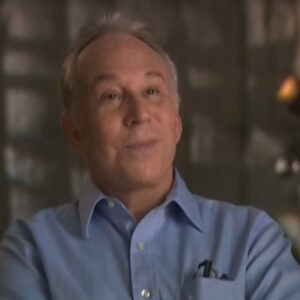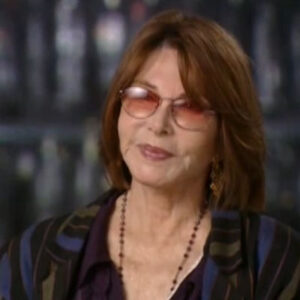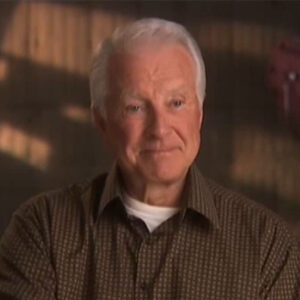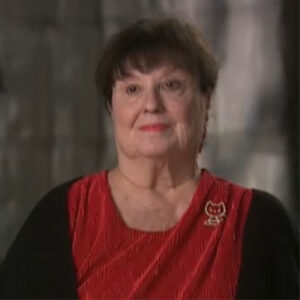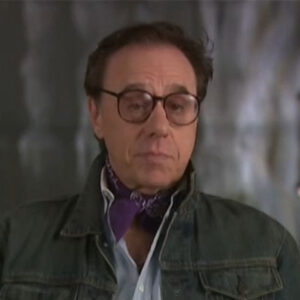Ken Welch: In 1955, I was accompanying auditions that Gus Schirmer was having, and I was there to play for anyone who didn’t have an accompanist and those who came in with their own didn’t need me. And among the people who came in was a very young Carol Burnett who had just arrived the fall before from from California. And she brought her own accompanist, Peter Daniels, and she sang. How about you? And I thought she was terrific.
Mitzie Welch: Which ‘How about you’?
Ken Welch: I like New York.
Mitzie Welch: Oh the regular one. No, no. I thought maybe Carol was doing comedy.
Ken Welch: She wasn’t not doing material then. And so I thought she she was she just looked so great with her California skin and. She was a picture of health and there was a directness of communication. That was unusual. And so when she finished, I turned to Gus and said, I think she’s terrific. And Gus, oh, she’s so raw. You have to know, Gus, to know how you would have said that.And so I said, excuse me. And I went out into the hall and I said, You don’t know me. My name is Ken Welch, blah, blah, blah. I thought you were terrific. And that was it.
Interviewer: What was it about her? That’s interesting that she wasn’t even doing comedy at the time. No. You saw something in her? Yeah, just just because her singing voice was so strong.
Ken Welch: Oh, it’s a kind of got to get communication direct that that Carol has. Yeah. It was unusual.
Mitzie Welch: She didn’t have any comedy really.
Ken Welch: She wasn’t doing comedy in that audition. Right. She had done comedy at UCLA. I didn’t know anything about that then.
Interviewer: What did how did you come to start working with her?
Ken Welch: That summer she went to a place called Green Mansions, which had a whole company of actors and comedians and dancers and so forth. And at the end of the season, she said to the choreographer who had choreographed a show of mine in Pittsburgh. I think I need to find a coach. And Frank Wagner, the choreographer, said, Oh, I know who you should go to. New York City. Yeah. And when when he said my name, he said, I think I think I met him. And so when September came around, my phone rang and it was Carol saying, I’d like to work with you.
Interviewer: What and what was your sort of vision? I mean, what did you see as sort of her strengths and weaknesses and what you thought was kind of material that would work for her?
Ken Welch: Well, what I really saw was just her talent. We started I accompanied her for her auditions, then starting, and she wasn’t getting tired. And so I said to her, maybe people don’t realize that you’re a comedian. And so how do we solve that problem? I need some material. OK, I’ll write some material. And then we we did. And we went to do a lot of auditions and then I auditioned for that. In those days, Gary Moore, who had a very popular 15 minute morning television show. In those days, Gary had regular auditions every Tuesday, which I knew about. And so I called and said of the thing and we went down and auditioned for Gary and he loved her and put her on one of his morning shows. And then that led to some more morning shows and so on.
Interviewer: What? What was kind of why did you think you needed to write her new material? I understand that you thought the material that was out there that was comedic, that was for women, wasn’t right for Carol. Is that right? Explain why you thought you had to write new material for her.
Interviewer: Was she unusual sort of musical comedy at the time?
Ken Welch: I don’t appear material that belongs to somebody else. Belongs to somebody else.
Mitzie Welch: She was busy playing parts in college. Yes. Yes. And, you know, that’s not the same thing as an individual thing to get up an audition with.
Interviewer: It was most of the sort of musical comedy pieces at the time, written more for older women pieces that would have worked for Carol or maybe more suited to.
Ken Welch: Was probably partly age. Mainly it was. I thought she needed something, right? And that’s what we did.
Interviewer: And what was. One of the first things that you wrote for her that she started to audition with.
Ken Welch: What we first did was a series of take offs on singers auditions, which. I really don’t remember the sequence. We we ultimately did mostly lose all the old fifteen minute daily. Gary Moore Show. And then I think her agent took some Kinney’s of those to her Jacoby down at the Blue Angel. And they had her, which then meant we had to have a whole act. And so we didn’t know what.
Interviewer: I want to talk about the Blue Angel in a minute. I just want to talk more about the singers for a minute. Can you talk a little bit about that routine and where the idea came from? It did. Carolyn, you work on it together?
Mitzie Welch: Actually, when Carol and Kenny started doing that, I said I’m I was a singer. I taught voice, you know. I was 22 or 23 at the time, but I had taught voice. So I knew every kind of singer there was from Broadway and everything. So it was kind of a mixed thing of saying, oh, what about that singer? And, you know, like the gesture singer and all kinds of. But that’s how it developed, I believe. Besides, I wanted to talk a little bit.
Ken Welch: Yeah.
Interviewer: Carol. So, I mean, she must have been.
Ken Welch: Sure. Sure. These were always collaborative.
Mitzie Welch: Oh, Carol, we never worked without Carol. Never. I don’t think it never worked. If we did it.
Interviewer: Was it. Were you. Did you have to encourage her, when you said when you originally saw her, she was really doing comedy? She wanted to be a singer. Right. How did you kind of say, let’s, you know, you really have a way with comedy? Or did you have to sort of.
Ken Welch: I don’t know. I think it was a given that I think I think we both knew that Carol was a comedienne.
Mitzie Welch: Carol wanted to be. Yes. She really was headed toward comedy from the beginning.
Ken Welch: But it’s orderings to see that we had to be material.
Interviewer: Was she confident as a singer when you first hooked up with her?
Mitzie Welch: She was caught. Carol was confident if she. Was funny, and and this is really a big one. If she didn’t have to do it alone, there was always more comfortable with somebody else.
Ken Welch: If she had somebody else to play off of in a scene or a song or. Yeah, sketch or whatever, she loves to have someone there and they have communication.
Interviewer: So it’s not just singing. You’re saying. No, no. Can you say I can explain.
Mitzie Welch: Yes, Carol would not probably do a monologue. Right. She’s not. She wants to have a scene with somebody who’s going to do that.
Ken Welch: I think temperamentally she’s not a standup, even though she has her standup material. But she doesn’t come. She doesn’t work as a, quote, comic and tell jokes or anything.
Interviewer: Excuse me
Ken Welch: OK. She she her temperamentally temperamentally. She’s not a standup. She has certainly done. She just she doesn’t stand up and do jokes.
Mitzie Welch: Right.
Interviewer: And it was there in the singers. Wasn’t very part of that where she played the high school girl who comes on at the end and gets sort of. She’s so enamored with the company.
Mitzie Welch: Oh yes. Well, that would explain why. Yes. When she did when Carol was doing one of the singers, she played the young girl who gave her music to the accompanist. And he just played a few notes, one or two or three into it. That was. Vote, but very, very loudly. And it was, you know, overblown. It was it was just great. And she had one, I remember where she had a sheet music with like 80 pages and threw it out on the piano. And I just trailed off the panel across the stage.
Ken Welch: Those came from my experience as an accompanist. You know, I had dealt with each of those ladies real in real life, didn’t they?
Interviewer: That’s that’s wonderful. That’s wonderful. Didn’t that sort of become explain?
Mitzie Welch: It did. Yeah. Well, it got a laugh when something gets a laugh. Well, anybody who’s a comedian, you’re going to do it. You know, in other situations, I think it works. So you keep it in your repertoire.
Interviewer: Can you just explain that that phrase to become.
Ken Welch: That’s wonderful.
Mitzie Welch: It’s like completely overblown when Carol did it. No one did. What phrase did. That was wonderful. Right.
Interviewer: So when did she start using that?
Mitzie Welch: Early. I don’t know the day. But you know what? She would Carol is like a savant. Yeah. She remembers dates, times, names, everything.
Ken Welch: She can tell you the day that anything happened.
Interviewer: I’ve noticed that. The few times I’ve spoken.
Mitzie Welch: Yeah, it’s true.
Interviewer: So, yeah, it was that was kind of like a catchphrase or something.
Ken Welch: In the early, early Gary Moore. But by this time, I don’t know. What do you want me to talk about this with? By this time, Gary had an evening show, an hour variety show, and one time Martha Raye was booked on the show and on Tuesday, she fell sick. I don’t remember what she had. And it occurred to Gary or Joe. I’m not sure which one to call Carol to see if she could step in. Carol went in, learned all the sketches that and the show on tape to the show on Friday and was fast and. Fantastic. And that led to her becoming a regular on the on the old Gary Moore. Our variety show.
Interviewer: Sort of back up one second when she was still in the audition. You said she was auditioning a lot and not getting things. Was that a difficult period in any way? Was you frustrated that she thinks you would or would not make it or what was her?
Ken Welch: It wasn’t she wasn’t depressed. I was I was disappointed that she was not being hired for any of these things for a number of them. She was too young because she was very young. I’m not good about years. So I don’t know how old she was when she was young and clearly a leading lady. She wasn’t an adjective.
Interviewer: So what was her, was she. Did you feel about her appearance? What seemed like she used she like to sort of exaggerate her appearance? That was part of the comedy initially.
Ken Welch: Well, the camera does something to Carol’s face that is not flattering. It makes your mouth look bigger. Carol, what was extremely attractive with the camera does the cameras not kind to her face.
Mitzie Welch: Carol has great skin, though. Yeah. And she looks wonderful on camera. I think. Yeah. There is a beauty to her that just glows with that. We can all glow like that.
Interviewer: But she obviously used that fact to her advantage.
Mitzie Welch: Yeah. Make it work. Yeah. Yeah. And she’d seen enough movies and seen enough satire in those movies to know what she was doing even if she didn’t know she knew it.
Ken Welch: Carol has an immense understanding. Yes, just immense. Things beyond the things that I assume she has no experience with. But she has an advanced understanding.
Interviewer: I mean, did she study? Did you help her sort of study comedy or singing? I mean, did you just all sort of come innately?
Ken Welch: I think innately is the right word.
Mitzie Welch: I don’t think you can turn anybody into that or an actress or a singer or anything. I think one is or one isn’t.
Ken Welch: Let me put it this way. I never could.
Mitzie Welch: Never could what?
Ken Welch: Turn anyone into a more talented version of themselves.
Interviewer: Can you just explain briefly what Tamiment was?
Ken Welch: Wonderful and it doesn’t exist anymore.It was a summer camp that I think went back to the 20s, perhaps in its origin. But there was a they had a full theater company, actors, singers, dancers, choreographer, director, composers, composers, lyricist, writers, orchestra. Amazing. In a way, we did a new revue, a new brand new revue every Saturday night for the outgoing customers. And on Sunday, the incoming group saw a second performance of that same show. Then on Wednesdays, we did a variety show which changed every week. So it was a terrific opportunity for writers and for this was the soprano, sort of Carol was the comedienne and Bernie Weston, Artie Jobson, Larry Kirk of West Side Story was in it.
Mitzie Welch: And we got to all these people who live with them.
Ken Welch: It’s a theater company. And when you live, you work day and night. Getting the show ready for the for the coming Saturday. And some terrific people in the past. I mean, that’s where Danny Kaye got his start thinking of trying to think of the producer’s name as Max Liebling. Yeah. And actually. And.
Interviewer: Yeah. Did you see Carol? She was at a time of really learning for her growing as a performer. What did you see?
Mitzie Welch: I think that for Carol, any experience is a learning experience. She is very willing to learn from something. Great listener. She’s amazing. And the courage, you know. Q And A, for example, is a learning experience. Every time she does it look so easy? Oh, I could do that. We’ve heard people say it’s hard. And she has such courage to do it. And it’s genuinely funny.
Ken Welch: I’ll never forget the first time we did Q and A. when she was on tour and we were in Dallas and we had talked about it and. She was not going to do it. No blamer. Bob Patterson do it and she did have it was it was magic from the first time. It was clear that she had that kind of, whatever you call it, talent.
Mitzie Welch: So, yeah. And I think that the audience trusted her all the time. They would ask questions that I don’t think they ordinarily would ask. Like one lady said, I remember I have to go to the bathroom. And so we have a clip of it. Well, she said, sure. Come on up. Here’s the show going on, she has her runs the stage until they’re ready, go in. Which door to date? I mean, you know, that takes courage and trust.
Ken Welch: And of course, she loved the applause when the woman came back from it.
Interviewer: That’s part of her appeal, is that people like you, like you said, people ask for things or say things to her that they wouldn’t like. Gregory Peck.
Ken Welch: Right. They were all her closest friend.
Mitzie Welch: She was a truly in your living room. She was truly in the studio next to you. There was an accessibility to Carol. That may be a word that we haven’t said. That really is true. You’re comfortable with her. She walked in right now. You’d be very comfortable with Carol.
Interviewer: And is it the same for the person, Carol, that we feel we know? Is it the same?
Ken Welch: It’s exactly the same person.
Mitzie Welch: She’s a little Carol, a little shy today. Today she’s. Yeah, today.
Ken Welch: And a lot of a lot of bad stuff has happened to Carol over the years. You know, we’re not supposed to. Have our children die before we do?
Mitzie Welch: Right. You know, I think Carol trudges through and I think that shows that quality. You know, I learned from her and well, we know each other so well. Fifty some years that if we didn’t learn from each other, we’re in trouble. Really?
Ken Welch: I was working with Mitz and with Carol at the same time in 1955. Right. Matter of fact, the first person that we did, I made a fool of myself over John Foster Dulles for was Mitz. And we did have the original version. And she said, you know what?
Mitzie Welch: I can’t please tell me. I believe I there. I would write this. It’s I think it’s wonderful. And I love the idea of Dallas being an idol for somebody because he’s so an Idol ish, if that’s a word. But I said there’s no punch to your song. Why did she get arrested? Why? What did she do? She’s allowed to worship somebody. Now you can take over.
Ken Welch: No, you you.
Mitzie Welch: Well, then you rewrote the part.
Ken Welch: We sure did.
Mitzie Welch: I said, well, maybe she could grab his briefcase or something, you know, to really get her arrested for a reason. And he took off from there.
Ken Welch: I didn’t take off. I just did it. Best thing going on was to do it.
Interviewer: It obviously worked.
Mitzie Welch: It worked.
Interviewer: Can you just explain what was it? Tell him John Foster Dulles was.
Ken Welch: He was the secretary of state. John Foster Dulles was the secretary of state under Eisenhower.
Mitzie Welch: Yes.
Ken Welch: And he was not. He was not an American Idol. He he was.
Mitzie Welch: John Foster Dulles was not a sexy man. I think in any way nothing against John Foster Dulles. But look at his name.
Ken Welch: For all I know, he was a very good secretary of state. He was not a sex symbol. No. And so I thought it would be fun to do a song about a woman who made a fool of herself over John Foster Dulles and. So we needed by the Carol by this time, had been running at the Blue Angel Club in New York time. I mean, she’d been renewed and renewed and renewed. And they take they take a few weeks off during the summer. And Herbert Jacoby, who runs them, ran the Blue Angel, said he wanted her to come back in September when the club reopened. But, of course, we’d have to have some new material. And so we had been talking about I had actually done an earlier version at Tamiment called Destroy Me.
Mitzie Welch: That’s right. Without a name or any. Right. And it wasn’t.
Ken Welch: And I’m glad we thought it was wonderful that your audience told us otherwise. It involved a breakaway costume and all kinds of production stuff anyway. So this idea for Dulles came to me and we we opened the show with it. When she came back in September and it was a big success, the first line of the verse. And people forget the first line of the verses. I’m so glad you came. I’m so glad you all came to visit me here in prison. And when you’re standing in the Blue Angel, which was all velvet and plush and stuff, and you say, I’m so glad you all came to visit me here in prison, it’s a good opening line.
Interviewer: It was actually a huge, huge, huge.
Mitzie Welch: All the newspapers when Dulles was done, I mean, not only of course did she get. Yes. Appearances, but the newspapers came out and accused the writer, Mr. Welch, of being a Republican if it was a Democrat writing or a Democrat. And of course, he didn’t have a slant at all. It was not about that.
Interviewer: But it did open a lot of doors.
Ken Welch: We did it on the Jack Paar Show in its early days. And Ed Sullivan immediately picked up on it. And he was on the following Sunday on The Ed Sullivan Show doing Dulles. And then a whole lot of stuff.
Interviewer: When she was on Ed Sullivan wasn’t there wasn’t there was a big night. Was it somebody else?
Mitzie Welch: Yes.
Ken Welch: What was that? Oh, that was the night that Elvis was on his first American appearance. Not American. I think the Beatles, his first appearance with Sullivan. On Sullivan.
Mitzie Welch: Yeah.
Ken Welch: This all seems like a thousand years was. Yes, it was.
Interviewer: And what was John Foster Dulles this reaction?
Ken Welch: He called. Yeah. He called her at the at the Blue Angel. And she was right. She really was John Foster Dulles on the phone. But he was immensely amused by the song.
Mitzie Welch: And then when we were in Washington, D.C. for the Kennedy Center for Carol, Colin Powell was in the room with us. And we went over and said, you know, we wrote John Foster Dulles for Carol, he said, when are you going to write one for me? But he was gone very shortly.
Interviewer: Yeah. When you when you were preparing to act for the Blue Angel. Tell me, what was Carol’s? Was she nervous about during that conversation?
Ken Welch: Well, it isn’t really carrying the show on your own because it’s a blue angel. They would have three or four acts. Mitz was there was a before or after care was after.
Mitzie Welch: I think it was after.
Ken Welch: So you were you were never carrying the show alone. There were three or four different acts. I can’t tell you every body who was on when Carol first was on. One of them was Jim Note of the magician S.A.C. Jones on. Oh, I think you’re right. He was a female impersonator, a wonderful female impersonator.
Mitzie Welch: And because I was working there at some point, I noticed that he there was a gown. He said, I’ve got a gown for you if you want to buy it. And I said, Oh, I. Too, because we didn’t have any money. And he brought this box and he said 50 bucks. And I said, Okay. That’s a lot of money for us. But I’m going to do it. I hadn’t tried a lot to get home. I turned around and walked down the aisle and Kenny started to laugh. And I said, What’s so funny? And he said, it doesn’t have a bottom. It’s just an empty, empty piece of net. Period. All it was all cut out.
Interviewer: You never wore that out.
Mitzie Welch: I never did.
Interviewer: So at this time, too, that her first Broadway show.
Ken Welch: Well, actually, she was rehearsing. We were rehearsing at my place. When the call came from the Phoenix Theater, which is the downtown theater in Manhattan, the year after we were all at the talent. Mary Rogers, Richard Rodgers daughter was there as a writer with along with the Dean Fuller and Jay Thompson and some other folks. And so they knew Marshall, Bear and Marshall. Yes. They knew Carol’s work. And they had they had written a version of the Hans Christian Andersen fairy tale, The Princess and the Pea called Once Upon a Mattress. And they wanted Carol to start Carol’s dream from infancy, I think was to work with George Abbott. And George Abbott was going to direct once one time after his dad was the Phoenix and they were calling her to do it. And I don’t know if there’s ever been that she’s ever been more thrilled or excited or fulfilled with sad as she was at that moment. And so it was a big success. It was such a big success that they moved it from the Phoenix up to Broadway theater. I don’t remember which they turned out and she got it there.
Mitzie Welch: Carol actually took the kids in the show and they went up and walked around the block. I remember trying to keep it open because it was an unusual thing, this show coming from where it came. But she did it herself. Yeah.
Interviewer: So what do you do? She walked around.
Mitzie Welch: They, in a sense, picketed for it. I don’t think that’s the right word.
Ken Welch: She was an activist for.
Mitzie Welch: Yes. Once upon a politically active, which was not right. That’s not her thing, you know.
Interviewer: Why did she have to do that?
Mitzie Welch: To keep it running. And I don’t remember. Rather than losing money. I don’t know. Or to get them to change it to Broadway, which I think is to move.
Ken Welch: I forgot where they moved up to. But it ran a long time and care was terrific and wonderful.
Ken Welch: And as you know, she has done it. She did shortly after that on television. Then they did another production in color on television. And then recently.
Mitzie Welch: She directed it right at UCLA. Then they decided to do it just last year.
Ken Welch: ABC did a production of very Laverick production with Carol. Now too old to play Winifred. She played the queen. And we wrote the song because we said, if you’re going to play the queen, you got to have another number. Yeah. We had one musical number. And so we wrote a song for that.
Interviewer: That’s obviously been one of her signature. Sure. Why do you think why is that so perfect for her?
Ken Welch: Why have you ever seen Once upon a Mattress? I am sure.
Mitzie Welch: That’s a good question.
Ken Welch: I shouldn’t say when I was going to say yes, I am because I want I’ve seen it with other people in it and you’ve seen it with other people living. You know why? Oh, fantastic. I’m not naming any names.
Interviewer: No, it wasn’t necessarily the part. In other words, it’s her. It was her.
Mitzie Welch: Yeah. Yeah.
Interviewer: Did you. You helped her prepare for that? Is that right?
Ken Welch: Actually, I don’t remember. I’m not sure that she had to audition. I think that Mary and Dean and J. Marshall had her in mind, I think she.
Mitzie Welch: Seems like it with the song, the songs. Do they feed Carol and she feeds them.
Ken Welch: It’s so long ago that I don’t know. Carol will know.
Interviewer: What was her big number?
Mitzie Welch: Shy. because she could really belt it out. You know, she didn’t need a mike. Sheryl has built in vocal chords that sound like she’s not even miked. And when she doesn’t have to be in the theater. I’ve never heard a bigger voice comes with no energy. I mean, that’s the wrong word. Effort.
Interviewer: What was that? Can you tell me about that number?
Mitzie Welch: Yes. She was asked a question. I can’t remember who asked Carol. I don’t know. Yeah. What made what brought him on? And she was explaining. I’ve always been shy, but the shy, you know, if the rafters would ring with it every time. So the audience went crazy. They loved it.
Interviewer: So how was that so received?
Ken Welch: It was always big, big, big success.
Interviewer: Did she win an award for that?
Ken Welch: Oh, boy, I can’t tell you that. I don’t know.
Interviewer: Were you there for opening night?
Mitzie Welch: Yes, we were. We were there. Were they were we there? I don’t know whether it is opening. We were there, certainly.
Ken Welch: Yes. I don’t know about the award business.
Ken Welch: She she said I don’t have any moneyAnd so I said, don’t worry about it. I went down to the stationery store and bought promissory notes. And in those days, I was just ten dollars an hour. Every time you come, you will sign one of these and that’ll be it. I made the same arrangement with Mitz, but she wouldn’t do it.
Mitzie Welch: I wouldn’t go for a session unless I had the tent with 10 bucks an hour, unless I had ten dollars to do it. She says it will just pile up and I’m a depression baby and I just.
Ken Welch: And she was working and she feels in church, church.
Mitzie Welch: And selling handbags. I mean, yeah, I had to be careful.
Interviewer: Carol, bring up a lot of.
Ken Welch: Oh, no. No, not many. I don’t remember. I have no memory of how much it was her. But she paid it off.
Interviewer: And so she sort of getting a lot of television appearances. And I’m just wondering, was television the goal for her at that time or did she feel it was kind of sidetracked her?
Ken Welch: Oh, I think the goal was always theater.
Mitzie Welch: That’s all we’ve ever written for is theater. I mean, it’s on television, but we think theatrically. Carol. Perfect for Carol.
Ken Welch: And the show. Oh, what? I mean, we haven’t talked about The Carol Burnett Show yet, but. When that show was done exactly like a stage show, no, we didn’t stop for anything and we didn’t do. I don’t know whether you’ve been to a television taping in recent era, but there’s 92 writers. And after every scene, the writers converge on the floor and rewrite the piece. And now the actors do it again for the same audience. It’s in my humble opinion, in my humble opinion, it’s murder. I don’t know how they get any audience reaction at all. Anyway, Carol, shows were done like live reviews and the only thing stopping was for costume changes or for scenery to move in. But it was done like show.
Mitzie Welch: Except we did stop the show for the pre taping of dancers. I mean, we we knew that had to be taped sometimes,.
Ken Welch: But the audience never had to sit through anything more than once.
Mitzie Welch: That was the big deal. Yeah. Because it killed comedy and she wouldn’t have anything to do with it.
Ken Welch: And Carol’s fears about that. Yeah. Right.
Interviewer: So a feed off.
Mitzie Welch: Sure. You know what to cut.
Interviewer: But back in before the Carol Burnett Show. Yeah. So this was television still considered sort of, you know, less than theater people, you know. How did Carol feel about it that way? Did she feel like she’s finding success in television? That’s where she wanted to be.
Ken Welch: I don’t know that Carol didn’t want to be intelligent in her. What brought her to New York was theater. and where we always approached everything as if it were theater.
Mitzie Welch: And a lot of people’s eyes today. Television is looked down upon in terms of it’s not theater. I don’t think Carol ever felt that way. A job is a job.
Ken Welch: And again, her experience, like in The Gary Moore Show, was done like a show. That was it. In fact, when we started off, it was free to do before the era of tape. So it was literally a live show. You had the time of the commercials, is what you had to to change the scenery. And that was it. I can remember when tape came in. Well, that’s enough. Another story.
Interviewer: Do you remember any of the particular pieces that you wrote for Carol along with Gary Morse?
Ken Welch: Oh, my goodness. My goodness, my goodness. My goodness.
Interviewer: What’s coming?
Ken Welch: Oh, that will do OK. That was with the.
Mitzie Welch: Out of the water, the rain.
Interviewer: Can you describe that?
Ken Welch: We didn’t do it. No. Is that Gary Moore Show?
Mitzie Welch: I think they did it again on the Burnett Show.
Ken Welch: Yeah, I know. We did. Together. Yeah.
Mitzie Welch: She just give me any water and whether everything was blown off the stage by the end, I don’t know.
Interviewer: Yeah, yeah. Do you remember any favorite numbers that show?
Mitzie Welch: I wasn’t on the Gary Moore Show so they probably weren’t as good.
Ken Welch: Good heavens. Good heavens. Good heavens.
Interviewer: What was her relationship with Gary like? That’s right.
Ken Welch: I think they were very close. I’ll tell you what happened on the show. Carol’s experience had been in the theater. So, of course, you give her a script and she’d memorize it. Gary and Durward vary. They started in radio. And so you read the script and you don’t mess with memorizing anything. Once Carol came on The Garry Moore Show, she she would learn her lines. But Gary and Durward were tied to the cue cards. So right quick, they the whatever that is, the competitive spirit came out and they started learning the lines through the sketches and the sketches got a whole lot better. Carol had that that effect because she is so loving. Among other things, she is the ultimate professional. You do not mess around you. You know what you’re doing,.
Mitzie Welch: But you have fun.
Ken Welch: Oh, yes.
Mitzie Welch: Her number one rule, if that’s truly able to have fun.
Ken Welch: But. Well, I’m jumping, but I’m going to jump on the Garry Moore on the Carol Burnett Show. Between dress and air was the most incredible time. The. In the end, the production room. Carol, Joe, the director, the writers.
Mitzie Welch: And performers,.
Ken Welch: Yeah, and they would say, OK, we’re 12 minutes over. So in this sketch, instead of we’re going to cut from page seventy three to seventy six.
Mitzie Welch: This was Joe Hamilton. Seventy three to seventy six.
Ken Welch: And they’re also, Carol, would take a moment.
Mitzie Welch: So that means that instead of putting I cut the exit here and make my entrance then two pages later. Right. So I did put it on a lap over here. I put the lamp there. OK. OK. Next they all got like. And Harvey would just thumb through the thing and know it. Tim. All of them. Vicki. Yes. Like the quiz kids.
Ken Welch: When I say this, she. He’s the ultimate professional. It’s exact. I mean. I mean exactly that. There is no kidding around. She is relaxed and funny.But, well, there’s just there’s no way to get more professional. That’s all I can say.
Interviewer: On The Gary Moore Show. She has said before, you know, sort of looking back at routines that period. She did a lot more sort of, quote, mugging. And I’m just wondering if you talked about her performances at all with her. Did you encourage her any more?
Mitzie Welch: No, no, no. We never talked about her doing more muggings. But she again, the self Learner in her good would watch and say, I’m sure she said to herself, oh, I’m too broad there or that’s mugging. Or, you know, she has a built in sense of taste.
Speaker Yeah, that was that’s sort of the style of the time.
Speaker Yes. Well, it was her style. She was younger than it was her style at the time.
Speaker Well, I think it was comedian. Look, Jerry Lewis, I mean, you know, it’s coming from abroad and I’m not knocking it. But that wasn’t really Carol. She did it at the time.
Speaker I think what she did was keep it more internal and it was funnier for her. I’m not talking about Jerry Lewis.
Speaker What about you? Can you tell me who she was married to at this time? Did you know her husband?
Speaker We knew Don. Oh, sure. You know which we are. We knew her husband. Dr. Ryan. Yes. Who was not her husband when they first came from California to New York.
Speaker And then they were married and were married for a period of time.
Speaker And what did you do? Was an actor.
Speaker He he wound up producing industrial shows.
Speaker It’s difficult to particularly then, for the man not to be working like the female, like the wife. It’s a very difficult situation because they were fun together and we will go to their house for dinner. And he would cook the dinner because he was there and she wasn’t. So I think that maybe is what the problem was because we love Don.
Speaker Yeah. Did he ever talk about her, what she was doing on the Gary Moore Show?
Speaker Not to me. Did he ever you.
Speaker No. But when we worked in Tamiment, Don was there. He came up. He was no, but he was working as a stage manager with later. I don’t think he was in from the beginning.
Speaker Yes, they were together. Yeah.
Speaker So did he. You don’t know if he sort of. Coach or advised? I don’t know. Oh, I would doubt it, but I don’t know.
Speaker So let’s just skip to the first special. Can you tell me how that came about?
Speaker Yes. Woo hoo. When I when I went on The Garry Moore Show to write the finales and openings in Chef, the first week that I came on the finale, the guest was Julie Andrews and I had done a finale on Song Bigi, which is the Frank Loesser song. And I wrote. We wrote a verse. She didn’t get credit.
Speaker And, you know, I was the silent wife. That’s hard to believe.
Speaker I think I was the silent part. And so.
Speaker The first day of rehearsal when when Julie and Carol walk into the studio, the rehearsal studio with their they both had their hair similar and they both had rehearsal clothes on. And I said to Bob better, we should do something with them as sisters.
Speaker They looked like they looked like sisters. Same height. Yeah. Built very at that time. Very similarly. Same sense of humour. Yeah.
Speaker Julie’s a true comedian, too. Oh, my goodness. Yes. She’s funny.
Speaker So the I actually found a story by Gavin Lambert and I thought I’ll make a musical out of this never happened. But in the meantime, Bob sold Julian Carol at Carnegie Hall.
Speaker And that’ll do it every day.
Speaker Mike Nichols was hired to go it and.
Speaker What do you think about performing at Carnegie Hall? Singing alongside Julie Andrews, one of those beautiful voices out there. She loved it.
Speaker I mean, it may have been a little overwhelming in the beginning to look out and see Carnegie Hall, but she was ready for it, wasn’t she?
Speaker Oh, my goodness. Yes. The problem was me with Julie Carol at Carnegie Hall is that we didn’t have any time in the venue. We were there.
Speaker I think a total of 24 hours.
Speaker We had rehearsed over to CBS. But it was a very, very, very tight schedule. For audio and scenery and band and everything to come in and was rough.
Speaker And it was written by Mike Nichols. But the name was Igor Petkovski.
Speaker He had a lane, had a contract with some beer company that they weren’t allowed to use their names. So like everybody knew, his real name is Igor Gonski. So that’s the way he’s built.
Speaker So tell me about you wrote the opening number. Tell me about that number.
Speaker I first wrote a number called Did They Saved Carnegie Hall Just for US?
Speaker Which I thought was pretty red hot and nobody loved it.
Speaker And one night when we were all of us, very into games in those days, we were all younger. There’s a game called Essence’s, which I ask you. You’re talking about somebody and I have to guess who it is. And I said, if this person were fruit, what would it be? If this person were colored, what would be this person were whatever. And it occurred to me that the connection made may seem weird, that I could make an opening out of that. And it really almost wrote itself in my head. You’re so London and so on. So on. And the tune came pretty quickly. And so I played it for the gang and they all loved it. And. And we did.
Speaker Yes.
Speaker What was the award that the show won.
Speaker We won. I think we won an Emmy for that one. I know that we won the Golden Rose at what? What is Switzerland. Yes. Montre. Yeah. That’s the one. Yeah. Oh, my thing. I think not. We only have one golden rose. We have one golden one and one bronze one.
Speaker Anyway, I think we are arguing about either did or did not win the following last year.
Speaker Was it true that in that show, both Julie and Carol also did a solo? Yes.
Speaker Can you talk about Jerrold’s feelings about doing a straight no. Talk about Carol’s feelings about doing it straight?
Speaker No, I can’t remember what I was going to work on for Carol, but it didn’t turn out well. And Bob better knew Robert Allen and Al Stillman, who wrote a terrific song called Meantime that was couldn’t have been more perfect for Carol.
Speaker And the song was not romantic. It was philosophical about herself. And there was a great deal of truth for Carol. It’s wonderful.
Speaker So it was the one thing in the show that I didn’t write. And it may have been the best thing. It. It’s a wonderful song. And it was perfect for her.
Speaker How did she feel about. About doing so?
Speaker Carol is much more comfortable not doing a straight song alone because the medley that we wrote on that show was endless. And those were straight songs, a lot of them with Julie. But she was very comfortable. Carol was very comfortable. There was Julie sitting next to her. So it makes a difference for Carol.
Speaker We did the history of musical comedy.
Speaker Did you have to talk her into doing.
Speaker No. No. You never had to talk Carol into a medley?
Speaker No. I mean the solo. No.
Speaker Oh, I think I think she realized that it was her turn required. Yeah, that it was.
Speaker Now, something you should do? I do. I just watched it again, and at the very beginning of the show, she is saying to you, you will tell her.
Speaker It’s sort of saying, I don’t really belong here. And I just thought it was any of that coming from the real Carol or was. Oh, well, yeah.
Speaker I mean, sure, the whole business of the relationship between Carol and Julie comes from who? Carol and Julie are.
Speaker I think the way we write is to organically write for someone. If that wasn’t Carol. I don’t think that we would have written that song.
Speaker No, no, no. But that’s I think that’s true in every one of the special. Yes. Whole them with Carolyn. Dolly.
Speaker Dolly Parton when they met.
Speaker They could not stop each could not stop complimenting the other. And so we picked up on that and the opening. I don’t know whether you’ve seen the special.
Speaker The special is the opening has called the long head of the pedestal. Yes. And we literally had special chairs built.
Speaker So when when you go up and then the other will end up and then the other one and then the chairs came down.
Speaker And it’s built in. It’s built entirely on their real relationship. That’s, I guess, what we do.
Speaker So let’s talk about The Carol Burnett Show. Tell me what it was like working on that and how you saw on the phone just about were there sort of a sign year? This is what this is what we’re looking for this week. Explain how it actually work.
Speaker Well, first of all, we had Carol had wanted this to come out from the beginning of the GARANT Carol Burnett Show and Mitch, who had never worked out on the West Coast.
Speaker So I’m always in the theater and I really loved New York, loved it.
Speaker And she said and I quote, Oh, I could never possibly work in Tinseltown. And I said, You haven’t worked out there. I had worked out here. I am sure she was. She was of one mind about that. And so we said, thank you very much, Carol. And she hired Melvin, who this woman is fantastic, John, to her. What was it two years later? We were doing both craft musical. And when the craft musical died in New York, whatever year that was, Carol calls again to say, Can you come out? We come out.
Speaker And in the meantime, we said finally, yes. But the funny thing was that in the meantime, Carol had been telling everybody who worked on the show. My friends are gonna come out and do this show. They are the most wonderful. You’ll see how you’ll love their work, too. I mean, they’re fantastic. And she’s telling this to everybody who’s working on the show. So, of course, they were ready for us. But anyway, when we got out here, we wrote the worst finale we’ve ever written in the history of show business. And it was with Smokey the Bear.
Speaker Smokey the Bear is alive and well and living in the forest with. I think she was ready to ship us back with Andy Griffith.
Speaker Andy Griffith and Barbara McNair.
Speaker Yes. Oh, God, it was awful. Second was much better. But then we got a little better.
Speaker How would it work each week? He would just sit around going, what do we do sometimes?
Speaker But we were given the guest. That’s what we were given.
Speaker We knew that generally for weeks ahead. And then it was up to us to come up with what would we like to do with that guest?
Speaker And then who’s gonna be in it? And is Tim gonna be into. Because Tim doesn’t saying, you know, and. But we loved working with him because he’s funny. And he was wonderful. I think he does sing. I think Tim is just making that up.
Speaker Then three weeks ahead, we would have to tell them in the production room what we were thinking of doing for whoever the guest was.
Speaker And then two weeks ahead, we had to be more specific.
Speaker We had to on the Friday of this week, we had to have finished the cassettes and the script for next week’s musical numbers and.
Speaker At the same time, we’d be running downstairs to watch the taping of this week’s show.
Speaker Would they ever give you limits? No. We were not given limits.
Speaker Joe was magnificent. Why wasn’t he given cuts? Because you have to. But he was so incredible. When I am talking about I think before when we envision Gershwin, I think I said it has to be on a ship. That’s Gershwin. So they built this incredible ship with the steam stacks and the dancers coming out of the stacks. And I said, okay, look what we cost them. I mean, I couldn’t believe that we had that to our. And it worked. And Joe was willing to do it. And she just loved it. It was her favorite. What we called many musical.
Speaker It was delicious. Yeah. Explain what those are.
Speaker We would take a composer or a lyricist and get the list of songs, and then we would make up a story to go with those songs. But that had nothing to do with where those songs came from in the book show. We just had to make up a story. Some were better than others. Gershwin was really good. The other things he mean besides many musicals. OK, we did epics which she loved. They were fun. Which were takeoff’s. One was a whole show on old movies. And one we did The Doyley Sisters. It took up the whole show. And we had so much fun. And we were doing it with all original songs that I didn’t mention cause we would have fun with that.
Speaker The Dolly Sisters was the first season that we worked.
Speaker That’s all. That’s right. We finally won. Everyone’s grace forgave us. And Harvey was so funny. Harvey was just great in it. She was fantastic. Vicki was great as her sister. The whole thing just worked.
Speaker Tell me, how would Carol learn this material every week?
Speaker Well, we made cassettes. He plays great.
Speaker We made cassettes every Friday. Mitch singing all the women’s parts. Artie Melvin. I’m not a singer. Artie Melvin singing all the Mansbridge. And those cassettes were duplicated and distributed to the guests and to the car.
Speaker Yeah. When they left the building on Friday after the taping, they took home with them the cassettes for next week’s show and the script, and it was up to them to learn it. And when they came in Monday morning, at whatever time it was 10, 45 or something, then we would rehearse those things, which they already presumably knew them.
Speaker We had an office. It was like six by nine. It was Ironi and already would come in once we had done it. And we literally staged it, didn’t we? Yeah, I see. Okay. I got on his lap here and now will kiss. So Kenny, try this beat. And he did then it was one of elation and then genuine say well what if I blah blah blah. And Artie would say no. I think if we stand and we knew what they were to do, not that it always got done that somebody called a choreographer or director, but we could see it. You had to visualize that. I think these things, you can’t do them unless you see them.
Speaker And what did Carol bring to that?
Speaker Well, she never came in without knowing everything. She knew it was on the cruise ship.
Speaker She knew. It’s great to watch her work and Harve and Tim and Vicki, all of them. Great.
Speaker I noticed also in this series, even when a lot of times she would be doing a street song, do it in a comedic.
Speaker Sure. Like there were.
Speaker Can you think of any example when I saw what she did? By the time I get to Phoenix. I think I was just trying to leave her husband in the car. Won’t start.
Speaker Yeah. I can’t remember the songs.
Speaker Those ones were not generally something that we did. Those often came from the sketch writers who would have a motion for Phoenix or whatever it was then.
Speaker Another way, though, for her to be able to do a straight.
Speaker Sure. I mean, in order for Carol to be comfortable, if a storm happens on rain or shine, she’ll do it if the car won’t start. And by the time I get to Phoenix, she’ll do it. So, you know, it had to be within her comfort zone because he couldn’t get Carol to do a straight song. Very seldom. If she played the old lady and she would sing to harvest rates on, then she did one of your songs. Yeah, right. He did.
Speaker Tell me about the theme song for that show.
Speaker OK, Joe, her husband wrote it. And I remember the day that he walked into our apartment. And so I think I have the feeling he played. Well, that’s what Joe did before The Carol Burnett Show was due. Special musical material for the old daytime Dinah Shore show with Bob Banner’s. Wasn’t Joe with the Meadowlarks or some Joe with the Skylarks? I don’t know. Have a vocally to vocal. Yes.
Speaker It was such a perfect song. Oh, yes. Perfect.
Speaker Yeah. It just seemed to capture her.
Speaker You know, I think it does exactly. The song is so perfect for her as a Charlie, too, because there’s so much feeling in it. And she always played against feeling. So we all cried.
Speaker That’s true. I think because it’s sort of the less is more. Right. And what was Joe Carol’s relationship on the set?
Speaker Joe and Carol’s relationship was good, wasn’t it? Fantastic was fantastic. I remember one time and they all broke up the way we’re doing a sketch and it was not any good. It was awful. Joe comes out of the control room, walks down the aisle, and he stops, he says to everybody, stop doing this. Well, everybody fell off the floor.
Speaker I think there was an audience there. Yes, there was. Harvey was in a chicken costume. Oh, it was disaster.
Speaker Yeah.
Speaker Or their relationship could not have been more absolutely professional.
Speaker And here is something I just want to say here about this show, because we were spoiled and didn’t know it. We thought all shows were like this then. And it was only after the show was over that even now I look back on and say it was miraculous. It was like a miracle because we’ve done a lot of shows since. They’re not like that one. Generally speaking, it was run so beautifully.
Speaker Wife, actress.
Speaker Yes. Yes. I have always been a writer and I would write. I mean, all of these scenes we were doing, they’re writing stories. That’s what writing to me is. And I I wanted to write a movie, but I didn’t know what I wanted to write about. And I wanted to do it by myself. I loved writing with Candy. I really do. But just wants to say I was really nice. I didn’t honestly think I’d sell it, but a friend of mine said, you’ve got to meet this woman who started the first recovery house. I think in this country, her name is Beatrice O’Riley. And I’d like to bring you down to Friendly House, which is still going on, all women. And you got to talk to her. You’ll want to write this story, and I hope I’ll go. And I went down and I loved Beatrice. Just a real Texan gal. And of course, she was a had been a drunk and she had to have had that experience really to hire these to let these girls all come in. They were in pretty bad shape. And I got to meet them all here, how she treated them. And I spent weeks in that with her. And one time we were with Carol, I wasn’t writing it for Carol. I was just writing it such a good part. And one time we were with Carol. Oh, you’ve got to meet this lady I’ve been working with. She’s fantastic. And what did she do? And I told her, she said, oh, I’d like to come and meet her. So we took Carol down. I think you were with me at the time. We took Carol down to meet Bea and Carol after meeting her on the way home. So I want to do that part. And I said, well, I’m writing a script for it. I mean, it was just amazing. And that’s how it came about.
Speaker What did you think about Carol?
Speaker Did you feel the minute she said it’s like, oh, yeah. The minute Carol said, I want to play that part, I really felt. That’s perfect.
Speaker Perfect care was born in San Antonio. Yeah, and the to me was they were always right, lady.
Speaker So that’s what happened.
Speaker But it was pretty heavy. Did you have any thoughts about Terrell being able to go there?
Speaker No, because I wrote it not for Carol. And I was so thrilled then when she said, I’m going to do that part. I didn’t try to make it therefore funny because it was a funny person and the house is still there if anybody wants to go to rehab.
Speaker Carol obviously also knew about. Oh, yes. Can you talk about that and what she brought to you?
Speaker Oh, I think she she used herself. Carol used herself completely in this role, at least for me. I was very moved by the humor and the pain of what she brought to it, which is what the role called for. She got frightened of doing it. The first reading I can remember, she said, I don’t think I can do this.
Speaker And I thought, well, she hates the script, of course. What else? Well, anyway, writer. They had nothing to do with it. It was the fear of doing this role where she’s on every page in it, you know, scene after scene of high emotion, which she did. She said, I’m not right for this. I’m not. Well, yeah, I don’t think I can.
Speaker Yeah. Yeah. Did she ever.
Speaker Can you just explain a little bit why, um, why this was a difficult part in some ways for Carol. What was her personal experience with the subject matter?
Speaker Well, she was around Carol was surrounded by alcoholism from the very beginning of her life. That’s what she knew from her mother and father, and that’s something I think people do know about it. And that was difficult. But again, the trudging through that, she always did.
Speaker And then with her daughter, terrible problems with Cherry, who was ill with addiction.
Speaker She now knows all this was an illness and she’s very compassionate about it all.
Speaker Was that part of it? How did she bring that to playing this role?
Speaker I think she used all a lot of what she was feeling growing up and playing then Beatrice and using what she had been through but never let out. It’s possible that she was able to let it out this way.
Speaker She seemed to feel just watching these movie scenes where she’s playing drunk.
Speaker Right.
Speaker Did you ever talk about how she’s going to play?
Speaker No. She’s always best. Well, generally, although she had a director with Lamont Johnson, but she’s always best finding her own way. That’s my feeling. Don’t you think?
Speaker Did you mean when you nanny?
Speaker Mm hmm. Of course, your sister wow, very well. Crazy. We don’t know. We never knew her mother, her father. And of course, we know she mentioned her sister and her daughter and her cousin.
Speaker Yeah, she’s very close to Janet, her cousin.
Speaker Do you remember when it happened that her mother passed away?
Speaker You know, one of her parents passed away, I think, when we were tamiment. But I, I think it must have been her mother because I think her father was already gone. As I recall, and this is along in the 50s. So I don’t know what I’m talking about, but that’s the memory I have.
Speaker Do you remember talking about she she talked to Bob.
Speaker Carol did talk about her, the loss of her mother. She told us she was very sad. But again, Carol, what is very private that way, she’s always pressing law. Although it’s interesting, the last few years with Carrie I had never seen your flight was when it’s your child. Well, it’s different when it’s your child. But she also we’ve both grown up together, in effect, both of us. And we got to know each other very well without having to talk even about it, about anything. And I remember we were in rehearsal with Von Stata, Frederique of on Stata, who was a great singer, and he is and we were all rehearsing and Carrie came in and I think she was born. We did a show with Carol and Frederic forever. And when she came when Carrie came in, it was shocking to see her because we knew or since he wrote a song when she was born for her and had the Garry Moore Singers come in the night that Carrie was warned.
Speaker I wrote a song about Carrie Louise and I called the Gary Moore Singers in our early the next morning. They came in, I written out the song that predicted overnight. They read the music, we rehearsed it. We went up to the hospital. We would enter Carol’s room and we sang So beautiful lullaby for Carrie Louise.
Speaker Gerald cried. Anyway, so what happened was once Carrie came into the room and she was all bubbly because Carol, our Carrie was that way. Full of life and was laughing about things. And I had I was sort of shocked. I didn’t know she looked like that so quickly. And then Carrie had to leave. And when we started to go back to rehearsal, I looked at Carol, she looked at me. We just walked toward one another and held one another and.
Speaker We both cried.
Speaker There’s nothing to say. No. I’m sure it was just unspoken, unspoken in there, but she was able to.
Speaker She was. Carol was able I knew what she was feeling, as much as one can know, since it wasn’t my child. But I knew what she was feeling in. I can’t really talk about it. All right.
Speaker Oh, I just thought it was wonderful that she was able to finish Hollywood arms, yeah, put that on.
Speaker Yes. Couldn’t have been a better tribute to Kerry than Hollywood arms.
Speaker What was manly, like you said?
Speaker He was just about like Carol portrayed here in Hollywood arms. She was direct, not unlike what Linda Lavin plays when she plays Navy.
Speaker But in The Burnett Show, when Carol plays Eunice, wasn’t she using a part of me? Eunice, we all love her. So I think she was using some of nanny’s force to do that character, don’t you? Okay. I didn’t say anything wrong, did I? No. Don’t do it to me. I think she’s right. Okay, good.
Speaker Mother, Ms. I understand. What could you tell me about their relationship or how important it was?
Speaker She was it. She was your mother. That’s right. She took the place of her mother and she was a no nonsense lady. Yeah. Fairless. Yeah.
Speaker Yes. Yeah. A little screwy. Yeah. I’d like to buy. All of us. We say this every day. We don’t. We’re nuts. And it’s true.
Speaker Let’s see. I just wanted to skip to the Beverly Sills special. Can you just tell me.
Speaker OK, OK. We were on a little vacation with Carol and she said, I think it’s time for me to do another special. And I wondering who I should do it with. And she said, what about Shirley MacLaine? And I said, I have nothing against Shirley, but surely can be and has been a guest on your series. We are. She had just been a guest the previous season, but free to do a special. It should be someone who cannot appear on your series or rubs it another way is different.
Speaker So just out of my head, I should. Someone like Beverly Sills.
Speaker And she should. Huh? And the following Monday, she had already called Beverly. And it was set to go to the agency.
Speaker Managers hadn’t been into it, having screwed up a little bit.
Speaker And we looked in each other and said, no. What? Because we didn’t know what they were going to sing together. And then we had to like, think about what? What can they sing? And one of the things was that the one thing in common that they certainly had it with their careers is Carol sang the blues as a straight singer. When she’d do it and Beverly was always a blues singer in opera because they’re always emoting, you know, with blues suffering. Yeah. They both suffered. So we use a grand piano and an upright for them to come in and saying to you.
Speaker And we wrote a special number for them to go into a medley of opera and pop music that she can someone who maybe wasn’t as confident her singing to do a special with the world’s best opera star.
Speaker I know. But that when they talked. When when Beverly in Carol got together, they were as one Beverly. They looked alike.
Speaker Beverly, when she started was Bubbles Silverman. Carol was Carol Burnett. They were both, whatever the word is, real people. I mean.
Speaker Oh, my goodness.
Speaker There is no diva in Beverly. No.
Speaker And God knows what, Carol and the we wrote an opening for them called Only an Octave Apart, as the premise of which was that was the only difference in their voice, because Carol was very frightened of singing at the Met.
Speaker And Beverly was saying, well, the only difference is we’re an octave apart. One a little notes. Octave apart. And that was a very actually very fun. I don’t want to do our army anymore.
Speaker It’s good. It’s good.
Speaker Carol’s career that she struggled with things, sort of words. It almost seems like. She’s just been so successful.
Speaker I think if Carol struggled as close as we are and as well as we know each other, I don’t think we know it.
Speaker I don’t know that we’d know it. But I think if there was such a time, it was just before The Carol Burnett Show. Maybe there were some rough days in there. And CBS had signed a contract with Carol before. Oh, I forgot. What’s with the.
Speaker Was it the retainers? I don’t remember. At what time? But CBS signed a contract that had a clause in it that said if within a period of time, a certain number of years you want a variety show of your own. All you have to do is what we called push the button and. That’s what she did, that’s what she did. And it so happened that CBS had forgotten all about clause of the contract. And I think there was a little attempt to backtrack and to say that was a good idea then. But now, anyway, Joe and Carol held him to it. Nobody thought that a variety show hosted by a woman was saleable. Nobody thought that anybody would watch it. Nobody thought it would last the required number of weeks. I forgot one of the contracts you had.
Speaker Maybe 30. We tried, but everybody was surprised, except perhaps Carol and Joe. And the show was a big hit.
Speaker Despite she people are still watching this show today. Little kids watch with their parents who watch with their parents, which is amazing. It doesn’t get well to me and to you. I believe it doesn’t get tired. It’s funny.
Speaker Yeah, I read I read disparaging remarks in some journals by writers who categorize something from one of the series today as sounding like The Carol Burnett Show.
Speaker And they’re wrong. It doesn’t.
Speaker Of course, she tried these things again. That might have been a discouraging ha ha ha. Because she tried to do another series, I think twice, wasn’t it? Twice. We did. We worked. We worked on it it with different writers. It just wasn’t The Carol Burnett Show anymore because they were young and they really didn’t know what to do. I want that humor was and that was hurtful for all of us. Was not a pleasant time. Not anybody did it on purpose, but it just didn’t work. And I think that hurt her.
Speaker I guess you just didn’t know what worked for her.
Speaker They didn’t they didn’t care enough about what she actually did.
Speaker Well, that kind of humor just didn’t work. We’re gonna be. They were wrote We’re gonna make you hip lady one. I know. Well, I think that’s what what’s going on.
Speaker You’re going for the younger.
Speaker Yes. Oh, see, that’s the thing. Young hip was one of the words, I think. Or in something else, not chic. Oh, God, no. I wouldn’t be young, smart, smart with one like as if we’re all dummies and we don’t know what they’re talking about. We know what they’re talking about. But we have, Carol, who does what she does.
Speaker That was one of those anthologies. Did you guys work on that? I couldn’t tell. I don’t know what the anthology where each episode was.
Speaker One story, like a different play, almost.
Speaker I don’t think I’m just reading the variety.
Speaker Yes, they were new shows, Carol and company and was just me.
Speaker And one of them was called Carol and Company and was not Disney. I forgot. Yeah.
Speaker Which was which was nothing too long but very long. I had to. Not that long. She bowed out and I was grateful for that. But you know, that’s got to hurt that it’s not. Yeah. You can’t do you can’t go home again. You just can’t do it again. But there’s still. Do you still running someplace.
Speaker So just tell me. I guess looking back, you know, what is the thing that is most unique about her? What is it about Carol that sets her apart from Lucy or from all the other performers that we’ve seen, comedians and singers?
Speaker Was there anything groundbreaking about or was it just that she was somebody we liked and she was funny and.
Speaker Well, for me, thinking about Carol and I said this once before, I would welcome her into my living room. I don’t know that I loved Lucy. I do Love Lucy all the work.
Speaker Brilliant. And Carol’s hero. But.
Speaker Carol, seem to belong to all of us. You know, it was not ever a distant drum, it was boom and it was a bass drum and it was right there. So I think we loved her, learned not to be afraid. It may sound corny, but I know I’m less afraid for having had this experience. And as Carol.
Speaker Yeah, I mean, I think all of our lives would be less without Carol. So direct. So right there. And unless you have some kind of fear blocking and it seems to me that you’ve got to get Carol.
Speaker And I think that’s entirely prejudiced, the passion, a compassion underneath is shows on the surface. I’ve seen her with very ill children, for example, and she was cheery. They came to a run through and she was smiling and talking to them. And I happened to be sitting right behind. And she held this child and hugged the child, looked over at me, and the pain in her eyes was unbearable. But she never showed that to this child.
Speaker So the compassion is there. Funny, it’s right underneath the. Well, the funniest part of it. Yes, it’s it’s.
Speaker It’s not somebody else’s funny.
Speaker So much of the show depended upon.
Speaker Her comedic comments on old movies where what she did was reveal what was really happening underneath that scene that we had seen, you know, in headless movies. But she had the talent of saying this was with that woman. And we all recognized it. Which is why we laugh.
Speaker Yes. And, you know, the Tarzan yell, for example, we did a whole series of edits on a bunch of Tarzan yells. I’m sure you’ve seen it. But that was a unique thing. And and she was asked every single show that we watched. Please do the Tarzan yell. And she never once said no. And she did it for them. And they went, oh, happy. That’s not easy to do every time. You know, and so I respect that. I use the term twice now that trudging along and being part of the audience to.

